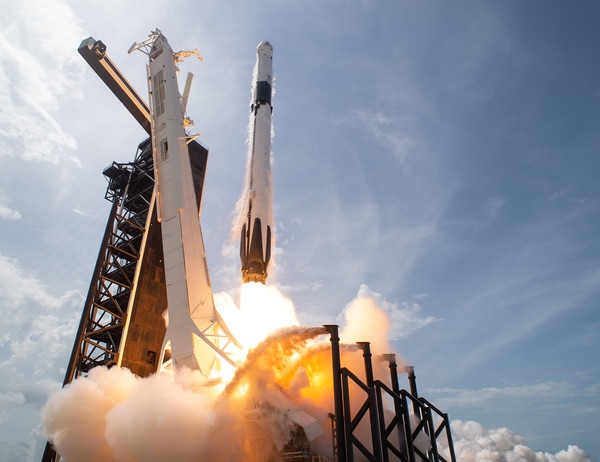NASA will not save 2020by A.J. Mackenzie
|
| Like 1968, some space enthusiasts are looking to NASA for inspiration, if not redemption. |
Well, 2020 looks to be giving 1968 a run for its money. We don’t have war or assassinations (though we’re only five months into the year so far) but we do have a pandemic that has claimed nearly twice as many American lives in three months as the entire Vietnam War. The economic repercussions of the pandemic have put about 40 million Americans out of work, creating unemployment on par with the Great Depression. And now we’ve seen protests and unrest, including violence and looting, in dozens of American cities after the death of a Minneapolis man, George Floyd, at the hands (or, rather, knees) of police.
Like 1968, some space enthusiasts are looking to NASA for inspiration, if not redemption. Ever since the pandemic took hold, NASA has emphasized that the SpaceX Demo-2 commercial crew mission would proceed as not just an agency priority but also a national one. “I am grateful, but I can also tell you that the nation is grateful, because what we are going to do this summer will absolutely stun the world,” the NASA administrator, Jim Bridenstine, said this spring, with Demo-2 being one of those things that will “stun the world.”
By the time Demo-2 finally lifted off this weekend, though, the world seemed more stunned by the protests in American cities and the incompetent handling of the pandemic by the American government. The media, though, still played up the angle of the launch as a “moment of hope” in its coverage, and NASA was happy to agree.
“We have had moments in time in American history where we’ve had challenges as a nation,” Bridenstine said at a press conference after the launch, mentioning the unrest of the ’60s. “Yet we had this moment in time, July 20, 1969, when all of America stopped, literally just stopped, because we had American astronauts walking on the surface of the Moon.”
“I think it happened today, as a matter of fact,” he then said. “All of America stopped. I’ve seen some of the numbers. The amount of viewership on what we accomplished today was off the charts. I am hoping that people can see this as something that is bright and hopeful and people know that tomorrow is a new day and a better day.”
But if “all of America” stopped for the launch, it didn’t stop for long. It was good to see major TV networks cover the launch live, but they soon tuned away amid the protests and unrest. And for good reason: they’re far more important than launching two astronauts into orbit.
It was unrealistic from the start to expect that the commercial crew launch would have any kind of unifying aspect for America. To begin with, the accomplishment pales in comparison with what NASA did in the ’60s. Back then, it was sending people to the Moon. In the words of a TV show at the time, NASA was going where no man had gone before. Today, it’s going back to orbit, something humanity has been able to do now for nearly 60 years. It’s just doing it a little differently. It’s hard to get too excited about that.
| Space enthusiasts have long had an outsized sense of importance about the space program. Public interest has never been as strong as those enthusiasts have imagined. |
But there’s a bigger problem: NASA couldn’t save 2020 because it didn’t save 1968. Yes, one person felt strongly enough about Apollo 8 to send that telegram to Borman, but in the bigger picture it didn’t alter the course of American society, or address the ills that made the year so bad. Sending humans around the Moon didn’t end the Vietnam War or improve civil rights, so why should launching astronauts back into orbit make people forget about a pandemic or social injustice today?
Space enthusiasts have long had an outsized sense of importance about the space program. Public interest has never been as strong as those enthusiasts have imagined. Recall that the only time a majority of the American public supported Apollo back in the 1960s, according to opinion polls of that era, was right after Apollo 11 itself. It’s of fleeting interest, like during a launch or a Mars rover landing, but that interest is neither deep nor sustained.
That doesn’t mean that space isn’t worth doing at all. But we can’t ask spaceflight to do more than it is capable of. It can do many things, from science and technology development to inspiration, but it can’t cure disease or solve economic inequality or address racial injustice, in one launch or a hundred. That’s not the job of the space program. That’s the job of all of us.
Note: we are temporarily moderating all comments submitted to deal with a surge in spam.
